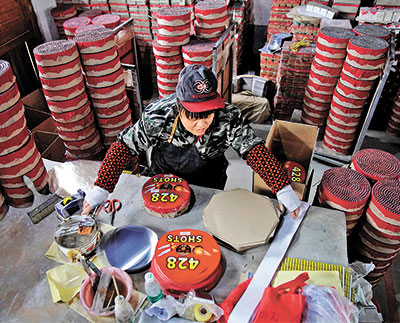
FROM the concrete bunkers carved into hillsides where workers gingerly handle piles of explosive black powder, to the shopfronts selling colorful boxes of pyrotechnics, time may be catching up with Liuyang’s millennium-old fireworks industry. Government efforts to curb pollution have led to bans on fireworks in 444 cities across China since last year. With the fast approach of the Lunar New Year, authorities have extended the bans further, including Beijing, Tianjin and the provincial capitals Hefei and Changsha. The sweeping bans have hit fireworks manufacturers already scrambling to adapt to shifting demographics and consumer trends. This year, the traditionally cacophonous celebrations for China’s most important holiday are likely to be much more subdued. At a fireworks wholesale market in Liuyang, a city of 1.3 million people in Hunan Province, business was slow, with shopowners and staff mostly idle. Some sat around tables playing mahjong, while others stared listlessly into their mobile phones. Numerous shopfronts were shuttered. “There really isn’t much business, we’re sitting here playing cards,” said one business owner, who said sales were down around 60 percent. “Look out there — there isn’t a single customer on the street, not even a ghost,” the shopowner said. Liuyang has been China’s pyrotechnics capital ever since fireworks were said to be invented here nearly 1,400 years ago during the Tang dynasty. The city’s hundreds of fireworks companies produce two-thirds of China’s fireworks, according to Liuyang government data. “For the national economy it may not be important. It’s a drop in the ocean,” said Chen Jiarong, who used to make bottle rockets on an assembly line and now employs 120 staff at his fireworks business. “But most of Liuyang’s ordinary people depend on the fireworks industry, on the factories.” While there is some automation, much of the production is still by hand. Liuyang’s factories are located high up in the hills, where workers, in individual bunkers with meter-thick blast-proof concrete walls, scoop a combustible compound of black powder into fireworks canisters. New safety measures require the installation of surveillance cameras which transmit live feeds to local police. The ban on fireworks adds to an already difficult business climate, according to around a dozen fireworks sellers. Fireworks remain popular in rural villages and smaller cities, where they are frequently used to mark occasions like funerals, weddings and other celebrations, they said. But demand had already been on the wane in larger cities, where there are restrictions on letting off fireworks outside the Lunar New Year period. Younger consumers in the cities also see fireworks as old-fashioned and were less inclined to let their children play with them due to a lack of space and safety concerns. Additionally, tighter safety standards and government regulations have also increased compliance costs for fireworks companies, leading the firms to push their products overseas. (SD-Agencies) | 
